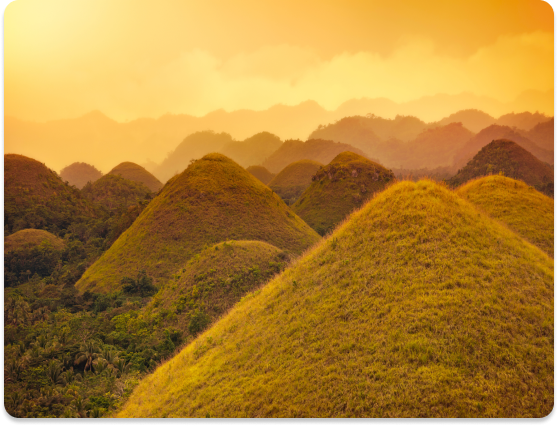The 4 Key Structures
Of Landform Feng Shui
陽 宅 四 局
One of the fundamental principles of Feng Shui is the use of landform structures, which significantly impact the energy flow or "Qi" of a particular location. The landform structures refer to the earth's natural features, such as mountains, rivers, valleys, and hills, and their arrangement in the landscape. These structures can either enhance or hinder the flow of Qi in a particular location and affect the quality of life of those living in that area.

Landform structures Fengshui is used to identify the most favorable location for building homes, offices, and other forms and determine the most suitable orientation and layout of a property and development.
*This information is suitable for people with basic Feng Shui knowledge
Back Mountain
is a critical aspect of a home's energy flow. It represents authority, elders, men, health, and support. The Back Mountain must be yin and quiet to attract positive energy and bring in good health and noble people. This will create a balance of energies and draw positive influences. However, if the Back Mountain is yang and active, it will repel similar energies and create an unbalanced flow of energy, leading to troubles without the help of noble people. This can also affect men's health, with diabetes or impotence being common issues. Therefore, it is vital to ensure that the Back Mountain is in a yin and quiet state to attract positive energy and maintain it.
Bright Hall
in Feng Shui represents wealth, family, and social connections. Therefore, bright Hall should be designed to be open and active to attract good energy and success in these areas. This means it should be spacious and allow for the free flow of energy. Furthermore, to further enhance the chances of wealth accumulation, applying the principle of attracting water first is recommended. If Bright Hall is too high or enclosed, it can negatively impact wealth and achievement. Similarly, if the back mountain is also empty, it can cause an imbalance of energy and weaken the head of the household. Therefore, it is essential to create a harmonious environment in Bright Hall to encourage the growth and prosperity of the family.
Green Dragon
represents thinking, judgment, temperament, and spirit. Like the back mountain, it is associated with men, noble people, and health. If the dragon side is present but lacks support from the rear mountain, it indicates the ability to create a goal but without the ability to achieve it. However, if the back mountain is too solid and oppressive, it can lead to impulsive actions without proper planning or judgment and the support of noble people. If the dragon side is strong, but the tiger side is empty, it can harm women, whereas if the tiger side is strong, but the dragon side is empty, it can harm men. This is because a strong dragon side represents wisdom, noble people, and good health. On the other hand, an empty dragon side represents a lack of vitality, the absence of noble people, and weak male energy.
White Tiger
represents essential aspects of the household, such as women, children, habits, and behaviors. It is considered a yin energy and therefore needs a "yang, active" energy to balance it out and attract positive energies. Without this balance, the household may experience difficulty in generating earning potential, which can cause financial problems. Additionally, suppose the dragon side is weak while the White Tiger side is strong. In that case, it can lead to situations where women may end up dominating the household, weakening the head of the family and creating tension.
The theoretical basis of Feng Shui is derived from the philosophy of Yin and Yang and the cyclical changes of it’s different factors. The theory explains the relationships between people, land, and the factors of Yin and Yang.
